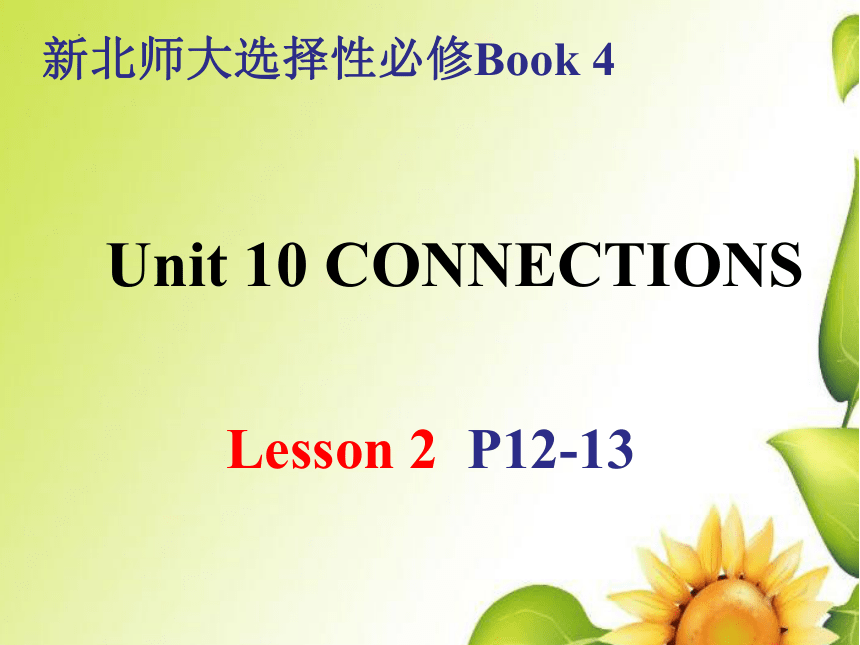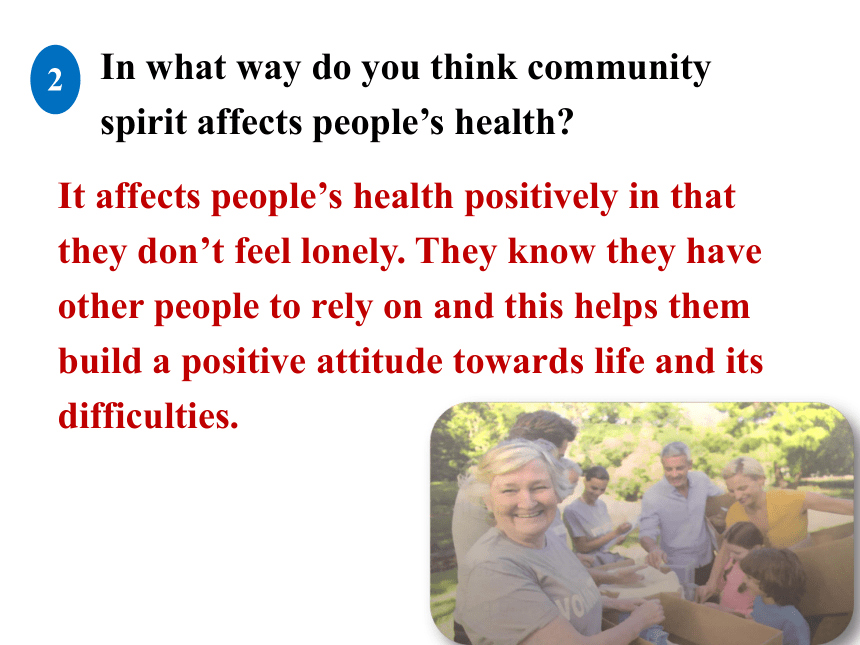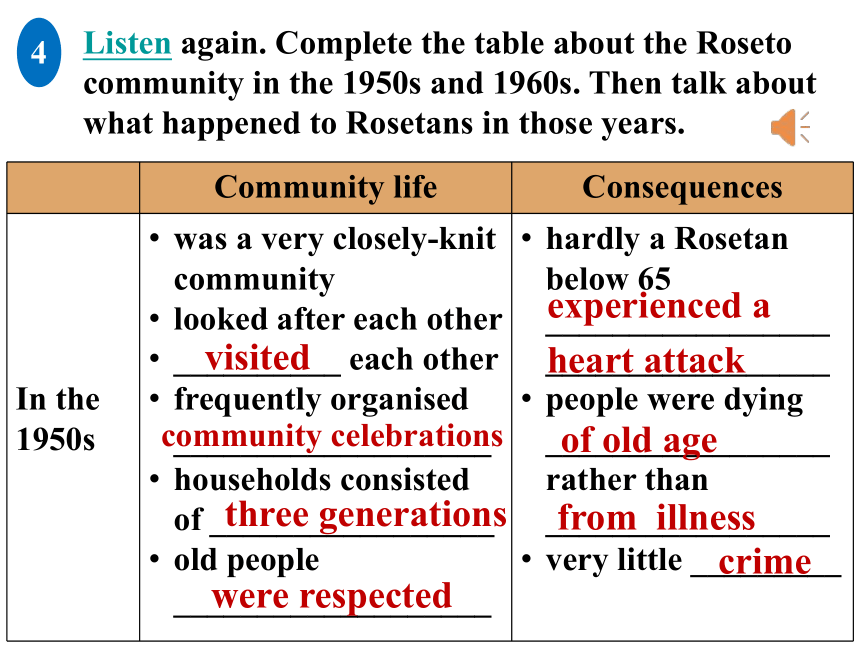北师大版(2019)选择性必修第四册Unit 10 Connections Lesson 2 Community Spirit 课件(共26张PPT)
文档属性
| 名称 | 北师大版(2019)选择性必修第四册Unit 10 Connections Lesson 2 Community Spirit 课件(共26张PPT) |

|
|
| 格式 | pptx | ||
| 文件大小 | 9.5MB | ||
| 资源类型 | 教案 | ||
| 版本资源 | 北师大版(2019) | ||
| 科目 | 英语 | ||
| 更新时间 | 2024-04-14 20:20:45 | ||
图片预览









文档简介
(共26张PPT)
Lesson 2 P12-13
新北师大选择性必修Book 4
Unit 10 CONNECTIONS
Community Spirit
What do these pictures tell you
A community is a familiar thread used to bring people together to advocate and support each other in the fight to overcome those threats. As human beings, we need a sense of belonging, and that sense of belonging is what connects us to the many relationships we develop.
What is a community
1
What do people do in a community
Pre-listening
look after each other
visit each other
organise community celebrations
respect elderly people
live in single-family houses
exercise together
travel together
…
2
In what way do you think community spirit affects people’s health
It affects people’s health positively in that they don’t feel lonely. They know they have other people to rely on and this helps them build a positive attitude towards life and its difficulties.
3
Listen and answer the questions.
While-listening
1. What surprising facts did doctors discover about Rosetans in the 1950s
Dr. Smith is talking about how the community spirit of a small town called Roseto impactd on the residents’ health in a radio programme.
There was hardly a Rosetan below 65 who’d experienced heart attacks. People there were dying of old age rather than from illness. There was very little crime.
2. What was the reason for the facts
According to an earlier study, the reason for the low rate of Rosetans’ heart attacks was the community itself. Roseto was a very closely-knit community. People there looked after each other, visited each other often. Almost all households consisted of three generations. Old people were respected. The social network they enjoyed protected them from the pressure of the modern world.
4
Listen again. Complete the table about the Roseto community in the 1950s and 1960s. Then talk about what happened to Rosetans in those years.
Community life Consequences
In the 1950s was a very closely-knit community looked after each other __________ each other frequently organised ___________________ households consisted of _________________ old people ___________________ hardly a Rosetan below 65 _________________
_________________
people were dying _________________ rather than _________________
very little _________
visited
community celebrations
three generations
were respected
experienced a
heart attack
of old age
from illness
crime
Community life Consequences
In the 1960s younger Rosetans ___________________ ___________________ moved to ___________________ ___________________ rejected ___________________ ___________________ ________________ ________________________________
in 1971
the rate of heart attacks ________________________________
would not keep up the
traditional lifestyle
typical
single-family houses
traditional
social bonds
the first heart attack
of a Rosetan under 45 happened
is the same as the average
What have you learnt about community spirit from the small town of Roseto Answer the questions.
5
Post-listening
How did Rosetans live in the 1950s Why did they have a low rate of heart attacks at that time
They lived in a very closely-knit community. People there looked after each other, visited each other often. Almost all households consisted of three generations. Old people were respected. They didn’t have too much pressure living there, which may be the reason for low rate of heart attacks.
2. How did the community change in the 1960s What was the result
In the 1960s, younger Rosetans would not keep up the traditional lifestyle. They moved to typical single-family houses and rejected to traditional social bonds. As a result, the first heart attack of a Rosetan under 45 happened and the rate of heart attacks is the same as the average.
3. What do you think the findings of the research imply What can we learn from the findings
6
Listen and complete the information.
Linda is talking with her grandpa, trying to find out more about her mother’s hometown.
Mum’s hometown _________________________
There weren’t _________________________
They didn’t live in flats but in _________________________
_________________________
The kitchen and toilet were _________________________
Hometown and living conditions in the past
was small
many tall buildings
a sort of house with two small rooms
outside the house
They were close to _______________________
They were _______________________
They were just like _______________________
Children _______________________
Neighbours _______________________
Relationships with neighbours
their neighbours
friendly to each other
a kind of big family
played together after school
often visited each other
7
Listen and plete the Talk Builder. What kind of language features can you identify
Talk Builder
Vague Language
like
a bit
a kind of
a sort of
Similar to something
Mum always tells me her hometown is small, but this is _________ a bit city.
like
Talk Builder
Vague Language
like
a bit
a kind of
a sort of
Part of a category
We lived in ____________ house…
We were friendly to each other, just like ___________ big family.
a sort of
a kind of
Less in quality
It was ___________ inconvenient.
a bit
8
For what purposes would you use vague language
To make a statement less strong.
To state something that you are not sure.
To …
9
Pair work. Introduce the community where you live with as much factual information as possible, using vague language where appropriate.
You can introduce the living conditions and relationships with neighbours in your community.
新北师大选择性必修Book 4
Language points P12-13
Unit 10 CONNECTIONS
1. additionally adv. 除此之外,此外
additional adj. 附加的;额外的
例句:
By 9:33 am, a burst of additional traffic might push it to 145 seconds.
到上午9点33分,堵车可能会把时间推到145秒。
例句:
Additionally, China also dares to say no to some unreasonable demands.
addition n. 加,加法;增加物;添加
in addition 除此之外,另外,况且
in addition to 除了……之外,另外
例句:
In addition, this phrase has two other meanings. 另外,这个习语还有其他两个意思。
In addition to English, he has to study a second foreign language.
除英语外,他还得学第二外语。
2. consequence n. 后果
as a consequence
= in consequence 因此,结果
例句:
The Chinese government took action quickly. As a consequence, the epidemic was quickly brought under control.
中国政府迅速采取行动。结果,疫情很快被控制。
consequent adj.
随之发生的;作为结果的
例句:His long illness and consequent absence put him far behind in his work.
他因病缺席很久,耽误了很多课程.
consequently adv.
因此,所以
例句:
This poses a threat to agriculture and the food chain, and consequently to human health.
这会对农业和食物链造成威胁,因此而危机人的健康。
as a consequence of
= in consequence of 因为,由于
例句:
In consequence of your bad work, I have to dimiss you. 由于你的工作很糟,我不得不把你解雇。
Thank you!
Lesson 2 P12-13
新北师大选择性必修Book 4
Unit 10 CONNECTIONS
Community Spirit
What do these pictures tell you
A community is a familiar thread used to bring people together to advocate and support each other in the fight to overcome those threats. As human beings, we need a sense of belonging, and that sense of belonging is what connects us to the many relationships we develop.
What is a community
1
What do people do in a community
Pre-listening
look after each other
visit each other
organise community celebrations
respect elderly people
live in single-family houses
exercise together
travel together
…
2
In what way do you think community spirit affects people’s health
It affects people’s health positively in that they don’t feel lonely. They know they have other people to rely on and this helps them build a positive attitude towards life and its difficulties.
3
Listen and answer the questions.
While-listening
1. What surprising facts did doctors discover about Rosetans in the 1950s
Dr. Smith is talking about how the community spirit of a small town called Roseto impactd on the residents’ health in a radio programme.
There was hardly a Rosetan below 65 who’d experienced heart attacks. People there were dying of old age rather than from illness. There was very little crime.
2. What was the reason for the facts
According to an earlier study, the reason for the low rate of Rosetans’ heart attacks was the community itself. Roseto was a very closely-knit community. People there looked after each other, visited each other often. Almost all households consisted of three generations. Old people were respected. The social network they enjoyed protected them from the pressure of the modern world.
4
Listen again. Complete the table about the Roseto community in the 1950s and 1960s. Then talk about what happened to Rosetans in those years.
Community life Consequences
In the 1950s was a very closely-knit community looked after each other __________ each other frequently organised ___________________ households consisted of _________________ old people ___________________ hardly a Rosetan below 65 _________________
_________________
people were dying _________________ rather than _________________
very little _________
visited
community celebrations
three generations
were respected
experienced a
heart attack
of old age
from illness
crime
Community life Consequences
In the 1960s younger Rosetans ___________________ ___________________ moved to ___________________ ___________________ rejected ___________________ ___________________ ________________ ________________________________
in 1971
the rate of heart attacks ________________________________
would not keep up the
traditional lifestyle
typical
single-family houses
traditional
social bonds
the first heart attack
of a Rosetan under 45 happened
is the same as the average
What have you learnt about community spirit from the small town of Roseto Answer the questions.
5
Post-listening
How did Rosetans live in the 1950s Why did they have a low rate of heart attacks at that time
They lived in a very closely-knit community. People there looked after each other, visited each other often. Almost all households consisted of three generations. Old people were respected. They didn’t have too much pressure living there, which may be the reason for low rate of heart attacks.
2. How did the community change in the 1960s What was the result
In the 1960s, younger Rosetans would not keep up the traditional lifestyle. They moved to typical single-family houses and rejected to traditional social bonds. As a result, the first heart attack of a Rosetan under 45 happened and the rate of heart attacks is the same as the average.
3. What do you think the findings of the research imply What can we learn from the findings
6
Listen and complete the information.
Linda is talking with her grandpa, trying to find out more about her mother’s hometown.
Mum’s hometown _________________________
There weren’t _________________________
They didn’t live in flats but in _________________________
_________________________
The kitchen and toilet were _________________________
Hometown and living conditions in the past
was small
many tall buildings
a sort of house with two small rooms
outside the house
They were close to _______________________
They were _______________________
They were just like _______________________
Children _______________________
Neighbours _______________________
Relationships with neighbours
their neighbours
friendly to each other
a kind of big family
played together after school
often visited each other
7
Listen and plete the Talk Builder. What kind of language features can you identify
Talk Builder
Vague Language
like
a bit
a kind of
a sort of
Similar to something
Mum always tells me her hometown is small, but this is _________ a bit city.
like
Talk Builder
Vague Language
like
a bit
a kind of
a sort of
Part of a category
We lived in ____________ house…
We were friendly to each other, just like ___________ big family.
a sort of
a kind of
Less in quality
It was ___________ inconvenient.
a bit
8
For what purposes would you use vague language
To make a statement less strong.
To state something that you are not sure.
To …
9
Pair work. Introduce the community where you live with as much factual information as possible, using vague language where appropriate.
You can introduce the living conditions and relationships with neighbours in your community.
新北师大选择性必修Book 4
Language points P12-13
Unit 10 CONNECTIONS
1. additionally adv. 除此之外,此外
additional adj. 附加的;额外的
例句:
By 9:33 am, a burst of additional traffic might push it to 145 seconds.
到上午9点33分,堵车可能会把时间推到145秒。
例句:
Additionally, China also dares to say no to some unreasonable demands.
addition n. 加,加法;增加物;添加
in addition 除此之外,另外,况且
in addition to 除了……之外,另外
例句:
In addition, this phrase has two other meanings. 另外,这个习语还有其他两个意思。
In addition to English, he has to study a second foreign language.
除英语外,他还得学第二外语。
2. consequence n. 后果
as a consequence
= in consequence 因此,结果
例句:
The Chinese government took action quickly. As a consequence, the epidemic was quickly brought under control.
中国政府迅速采取行动。结果,疫情很快被控制。
consequent adj.
随之发生的;作为结果的
例句:His long illness and consequent absence put him far behind in his work.
他因病缺席很久,耽误了很多课程.
consequently adv.
因此,所以
例句:
This poses a threat to agriculture and the food chain, and consequently to human health.
这会对农业和食物链造成威胁,因此而危机人的健康。
as a consequence of
= in consequence of 因为,由于
例句:
In consequence of your bad work, I have to dimiss you. 由于你的工作很糟,我不得不把你解雇。
Thank you!
同课章节目录
- Unit 10 Connections
- Lesson 1 How Closely Connected Are We?
- Lesson 2 Community Spirit
- Lesson 3 Anne of Green Gables
- Unit 11 Conflict And Compromise
- Lesson 1 Living In a Community
- Lesson 2 Dealing with Conflict
- Lesson 3 War Memories
- Unit 12 Innovation
- Lesson 1 Scientific Breakthroughs
- Lesson 2 Aha Moment
- Lesson 3 Stephen Hawking
